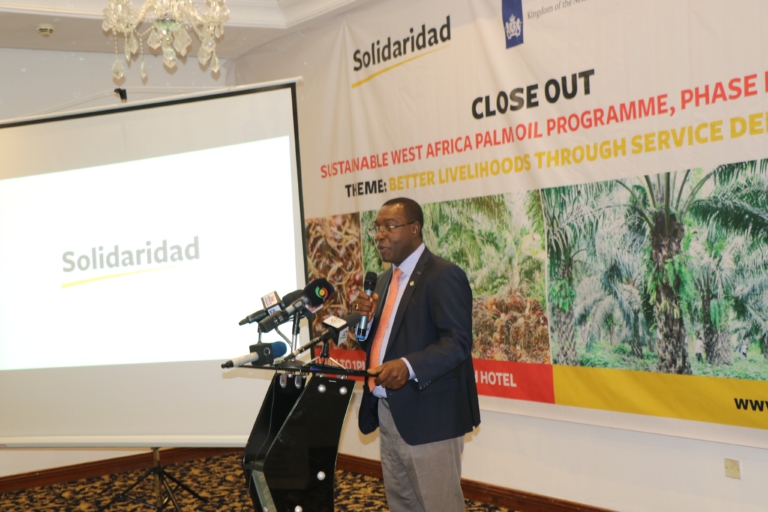Solidaridad West Africa having raised four million euros from financial institutions for participating small and medium enterprises and 1.9 million euros mobilized by Village Savings and Loans Associations established under the programme, has formally ended the second phase of its flagship oil palm programme, the Sustainable West Africa Palm Oil Programme (SWAPP II), with a close-out event in Accra.
Mr Isaac Gyamfi, the Regional Director for Solidaridad West Africa, speaking at the close-out event of the programme, said, “It is worth noting that with the support, collaboration and additional financing from the German government, oil palm is now one of the few agricultural Technical and Vocational Education and Training that has a nationally accredited in the competency-based training curriculum with accredited schools.”
The four-year programme, implemented between 2018 and 2022, sought to transform the West African palm oil sector into an inclusive and sustainable sector through micro, small and medium enterprises that provide large-scale yield intensification and farm rehabilitation services to oil palm farmers and efficient processing of fresh fruits bunches in Ghana, Cote d’Ivoire, Liberia, and Sierra Leone.
He said that in addition to increasing the capacity of the project’s recipients, the program also worked with financial institutions to increase their capability to assist farmers.
“As part of the process, 113 financial institutions and impact investors were engaged, 56 financial institutions were trained in oil palm business appraisal,” he said.
He said that as part of the scheme, Solidaridad built 384 Village Savings and Loans Associations and effectively connected them to financial institutions.
According to Mr. Gyamfi, the initiative concentrated on enhancing access to finance and offering technical help for small and medium-sized businesses based on two complimentary business cases in order to accomplish the stated goal.
These include setting up rural service centers that give farmers the inputs and best management practices (BMP) required for oil palm planting, as well as setting up more effective and environmentally responsible SME milling operations. Following the successful implementation of the first phase, SWAPP II was co-funded by the Swiss Government through the State Secretariat for Economic Affairs and the Embassy of the Netherlands in Accra (2013-2017).
It illustrated the commercial viability of creating a sustainable oil palm and processing industry in West Africa along the lines of small and medium-sized businesses.
53,602 beneficiaries, he claimed, have been reached across the four participating nations.
According to the regional director, the initiative improved beneficiary smallholder farmers’ oil palm plantation yield from an average of 5.2 to 9.1 tonnes per hectare.
He claimed that 55 Rural Service Centers were established by the initiative, which supported small and medium-sized businesses, and that seven enhanced oil palm mills were built and another 13 were upgraded as part of attempts to boost production.
These businesses offered 12,263 smallholder farmers services.
He said in Ghana, Solidaridad enforced the Oil Palm Development Association of Ghana as the umbrella private sector Association for the sector and developed its capacity to contribute to the advocacy for the establishment of the Tree Crop Development Authority.
Under the programme, Solidaridad and the German Agency for International Cooperation (GIZ) under the Ghana Skills Development Initiative, jointly developed the curriculum for competency-based training in oil palm. The curriculum is accredited by the Commission for Technical and Vocational Education and Training.
Five hundred and six youth were trained in four out of the six competency areas in the first quarter of 2021 and 36% of them have been employed in the sector.
Madam Anne Schick, acting head of cooperation at the Swiss Embassy in Ghana, said that the development of a competitive and sustainable oil palm industry in Ghana has advanced significantly thanks to the initiative
“I appreciate the good work that has been done by Solidaridad together with partners. Through SWAPP II, the government and people of Switzerland are happy to have supported Ghana’s desire to become self-sufficient in palm oil production and related products.”
According to Madam Schick, Phase II of the Ghana Private Sector Competitiveness Programme would continue to provide support for the palm oil industry from the Swiss government.
The second phase of the Sustainable West Africa Palm Oil Program in Ghana is being co-funded by the Dutch and Swiss embassies, according to Mr. Jeroen Verheul, the Dutch ambassador to Ghana.
He stated that the Embassy’s planned cooperation strategy in Ghana for the following five years would put a strong emphasis on commerce, employment, and the cocoa and horticulture industries.









